Human Anti-Glypican-3 Antibody Product Attributes
Species: Human
Tested Applications: Flow Cytometry, Immunofluorescence, Immunohistochemistry (IHC).
Application Notes: Flow Cytometry (0.5-1ug of antibody/million cells in 0.1ml), Immunofluorescence (0.5-1ug of antibody/ml), Immunohistochemistry (IHC) (Formalin-fixed) (0.5-1ug of antibody/ml for 30 minutes at RT)
Clonality: Monoclonal
Anti-Glypican-3 Antibody Clone: SPM595
Clone SPM595 Host and Isotype: Mouse IgG1 kappa
Anti-Human Glypican-3 Positive Control Sample: 293T cells or Hepatocellular carcinoma
Cellular Localization of Antibody Cytoplasmic
Buffer and Stabilizer: 1mM PBS with 0.05% BSA & 0.05% azide.
Antibody Concentration: 200ug/ml
Antibody Purification Method:Protein A/G Purified
Immunogen: A recombinant fragment containing amino acids 511-580 of human glypican-3
Storage Conditions: Store at 2 to 8° C (refrigerate). Stable for 24 months when properly stored.
Glypican-3 Previously Observed Antibody Staining Patterns
Observed Subcellular, Organelle Specific Staining Data:
Anti-GPC3 antibody staining is expected to be primarily localized to the plasma membrane.
| Glypican-3 General Information | |
|---|---|
| Alternate Names | |
| Glypican-3, GPC3 | |
| Molecular Weight | |
| 67kDa | |
| Chromosomal Location | |
| Xq26.2 | |
| Curated Database and Bioinformatic Data | |
| Gene Symbol | GPC3 |
| Entrez Gene ID | 2719 |
| Ensemble Gene ID | ENSG00000147257 |
| RefSeq Protein Accession(s) | XP_016884902, NP_001158090, NP_001158089, NP_001158091, NP_004475 |
| RefSeq mRNA Accession(s) | XM_017029413, NM_001164618, NM_001164617, NM_004484 NM_001164619 |
| RefSeq Genomic Accession(s) | NC_018934, NG_009286, NC_000023 |
| UniProt ID(s) | Q53H15, B4DTD8, I6QTG3, P51654 |
| UniGene ID(s) | Q53H15, B4DTD8, I6QTG3, P51654 |
| HGNC ID(s) | 4451 |
| Cosmic ID(s) | GPC3 |
| KEGG Gene ID(s) | hsa:2719 |
| PharmGKB ID(s) | PA28832 |
| General Description of Glypican-3. | |
| Glypican-3 (GPC3) is a glycosylphospatidyl inositol-anchored membrane protein, which may also be found in a secreted form. Anti-GPC3 has been identified as a useful tumor marker for the diagnosis of hepatocellular carcinoma (HCC), hepatoblastoma, melanoma, testicular germ cell tumors,, Wilm s tumor. In patients with HCC, GPC3 is overexpressed in neoplastic liver tissue, elevated in serum, but is undetectable in normal liver, benign liver,, the serum of healthy donors. GPC3 expression is also found to be higher in HCC liver tissue than in cirrhotic liver or liver with focal lesions such as dysplastic nodules, areas of hepatic adenoma (HA) with malignant transformation. In the context of testicular germ cell tumors, GPC3 expression is up regulated in certain histologic subtypes, specifically yolk sac tumors, choriocarcinoma. A high level of GPC3 expression is also found in some types of embryonal tumors, such as Wilm s tumor, hepatoblastoma, with a low or undetectable expression in normal adjacent tissue. In patients with thyroid cancer, expression of GPC3 is dramatically enhanced in certain types of cancers: 100% in follicular carcinoma, 70% in papillary carcinoma. Expression of GPC3 in follicular carcinoma is significantly higher than that of follicular adenoma. In contrast, GPC3 is not expressed in anaplastic carcinoma. | |
Limitations and Warranty
enQuire Bio’s Glypican-3 Anti-Human Monoclonal is available for Research Use Only. This antibody is guaranteed to work for a period of two years when properly stored.

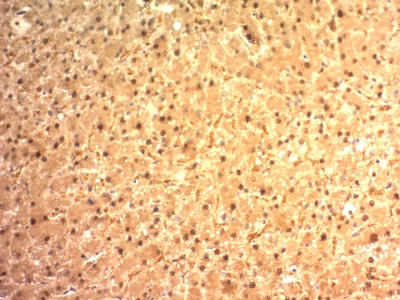

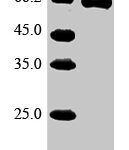
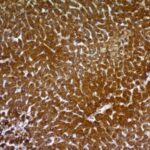
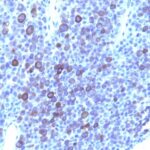
-150x150.jpg)

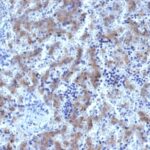
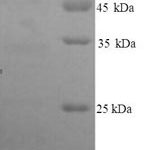
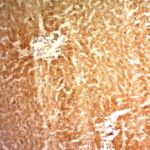

Reviews
There are no reviews yet.